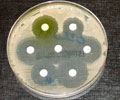- A new antibiotic from Kenyan ants is discovered by a research team from University of East Anglia.
- The antibiotic was found to be potent against Methicillin resistant Staphylococcus aureus (MRSA)
- Potential for use against antibiotic resistant strains
Potent against Antibiotic Resistant Bacteria
The latest laboratory tests which were conducted on the newly identified antibiotics have shown that they are effective even against- Vancomycin-Resistant Enterococci (VRE)
- Methicillin resistant Staphylococcus aureus (MRSA)
Antibiotics
The currently used antibiotics are derived from the group of bacteria called actinomycetes which were identified in the soil nearly half a century ago. That period is known as the Golden age of antibiotics.The indiscriminate use of antibiotics has resulted in antimicrobial resistance (AMR), a condition in which the infective bacteria fails to respond to antibiotic therapy due to evolved mechanisms of resistance.
According to Dr. Matt Hutchings from University of East Anglia, the chemical ecology formed between bacteria that produce antibiotics and insects that grow fungus, a protective symbiosis, is a key area of study that will aid in identifying a new source of anti-infective drugs. An example of this relationship is the Kenyan plant-ants which exist in symbiosis with acacia trees. These ants are found to live in the hollowed structures of the thorny tree while growing fungus in the trees feed the ants. This relationship is equally beneficial to the tree as animals, including elephants, will not eat plants when they are covered with ants.
Antibiotic Resistance
The growing resistance to antibiotic therapy threatens treatment and prevention of infections that were caused by viruses, bacteria, parasites as well as fungi. This is a serious global threat which has called for action of leading government and non-government organizations across the world.Antibiotic resistance leads to 480,000 people developing tuberculosis which is multi drug resistant. Apart from TB, antibiotic-resistant strains of bacteria threaten to affect therapy for AIDS as well as malaria.
- the drugs that are used for therapy become ineffective
- the strains of microbes spread rapidly
- inability to treat even common infections
- prolonged illness, disability or death of the patients
- organ transplant, caesarean sections, hip replacements, management of diabetes or even cancer chemotherapy are high-risk procedures due to the risk of infection of these microbes
Actinomycete Bacterial Strains
Many strains of actinomycetes were isolated form the acacia plant in which the ants lived. A few among these were selected for gene sequencing. Out of all the strains that were sequenced, the research team found that there was- A specific strain of actinomycetes that produced antibiotic compounds with the ability to fight other diseases in the initial tests that were conducted.
Validation of the Result
The tests were repeated by growing the strains in very low and sub-inhibitory concentrations of formicamycins for 20 generations. The research team found no signs of higher level of resistance to the newly identified antibiotics.Dr.Wilkinson from John Innes Centre said that the findings of the study signify the importance of identifying newer territories for effective antibiotics. The latest advancements in sequencing and genomic editing tools could be used to identify the unidentified species of bacteria that produce natural antibiotics. This, according to the professor, will be precious in the fight against antibiotic resistant bacteria.
There is an urgent need to identify solutions for antibiotic resistant bacterial strains as they can lead to serious health complications due to uncontrolled spread. The newly discovered antibiotic promises to control the spread of these microbes, offering hope to many people at high risk.
References:
- Zhiwei Qin, John T Munnoch, Rebecca Devine, Neil A Holmes, Ryan Seipke, Karl A Wilkinson, Barrie Wilkinson, Matthew Hutchings. Formicamycins, antibacterial polyketides produced by Streptomyces formicae isolated from African Tetraponera plant-ants. Chem. Sci., 2017; DOI: 10.1039/C6SC04265A
- Antimicrobial resistance - (http://www.who.int/mediacentre/factsheets/fs194/en/)















